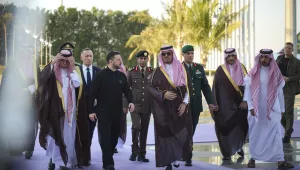A seminar with Melani Cammett, Professor of Government, Harvard University and MEI Faculty Affiliate and Ishac Diwan, Distinguished Chair of Arab World Studies, Paris Sciences et Lettres and MEI Affiliate on their recent publication A Political Economy of the Middle East.
Moderated by Hedi Larbi, Kuwait Foundation Visiting Scholar, Middle East Initiative.
This event will be followed by a book signing with the authors at 6:00pm at the Harvard COOP at 1400 Massachusetts Avenue, Cambridge, MA.
About the book:
"A Political Economy of the Middle East is the most comprehensive analysis of the political economy of development in the contemporary Middle East over the past several decades, examining the interaction of economic development processes, state systems, state policies, and social actors in the Middle East.
The fourth edition, with new authors Melani Cammett and Ishac Diwan, has been thoroughly revised, with two new introductory chapters that provide an updated framework with which to understand and study the many changes in demography, education, labor markets, urbanization, water and agriculture, and international labor migration in the recent years. The new edition also includes: a new chapter that charts the political economy of the Gulf states and in particular the phenomenal growth of oil economies; a new chapter on the growth of the private sector and its effects in the region; a new chapter on the rise of "crony capitalism;" and increased coverage of the changes in civil society and social movements in the region including an exploration of the causes, dynamics, consequences, and aftermath of the Arab uprisings."
-from Westview Press
About the Authors:
Melani Cammett is Professor of Government at Harvard University and a Faculty Affiliate at the Belfer Center's Middle East Initiative. She specializes in the political economy of development and the Middle East and North Africa and is the author of four books: A Political Economy of the Middle East (with Ishac Diwan, Alan Richards, and John Waterbury, 2015), Compassionate Communalism: Welfare and Sectarianism in Lebanon (2014), The Politics of Nonstate Welfare (coedited with Lauren Morris MacLean, 2014), and Globalization and Business Politics in North Africa: A Comparative Perspective (2007, 2010). She has received fellowships and awards from the Andrew W. Mellon Foundation, the Qualitative and Multi-Methods Research Section of the American Political Science Association, the Smith Richardson Foundation, the U.S. Institute of Peace, the Harvard Academy for International and Area Studies, the Social Science Research Council, and other organizations, and has published numerous articles in scholarly and policy journals. Her current research focuses on the politics of welfare and development and she has a variety of ongoing projects on governance and the delivery of social services by public, private and nonstate actors in the Middle East and North Africa.
Ishac Diwan is an Affiliate at the Belfer Center's Middle East Initiative and he currently holds the Chaire d'Excellence Monde Arabe at Paris Sciences et Lettres. He received his PhD in economics from the University of California at Berkeley. He taught Public Policy at the Kennedy School of Government from 2011-2014. He is widely published in the areas of trade and finance, and has dedicated much of his research in the past few years to Middle Eastern affairs. His current research interests include growth strategies, the political economy of private sector development, and the analysis of public opinions, with a special interest in Africa and the Middle East. He directs the Economic and Political Transformation program of the Economic Research Forum. He was at the World Bank from 1887 to 2007, with stints in the Research Complex, the Middle East Department, and Operations. Diwan lived in Addis Abeba (2002-07) and Accra (2007-11), as the Bank's Country Director for Ethiopia and Sudan first, and then for Ghana, Liberia, Sierra Leone, Burkina Faso, and Guinea.
Former Minister Hedi Larbi is the Kuwait Foundation Visiting Scholar at the Belfer Center's Middle East Initiative. He most recently served as Advisor to the MENA Vice President at the World Bank, and from January 2014 to February 2015 served as both the Minister of Economic Infrastructure and Sustainable Development and the Economic Advisor to the Prime Minister, Tunisia. Mr. Larbi has over 35 years of professional experience in economic and social development as both a policy advisor and policy maker, with more than two decades of high level work in the World Bank Group, the private sector (in Europe and Middle East and North Africa), and the Tunisian transition government. Mr. Larbi also has substantial expertise in the areas of public policy, economic and sectoral development strategies, private sector development, infrastructure services, human capital development, public finance and macroeconomic management, infrastructure (transport, water, energy, and urban services), social sectors (education, health, social protection), and more. He has developed, negotiated and supervised major economic and institutional development programs, and public and private investment operations in various social and economic sectors including major infrastructure projects and economic reforms. Mr. Larbi has an excellent knowledge of the economic, institutional, political and social challenges of the MENA region as well as of many Sub-Saharan countries. To a lesser extent, his regional experience extends to Latin American Countries and East and Central European Countries in the context of cross-support and policy advice to governments and World Bank teams. Mr. Larbi holds an MSc in Civil Engineering from the Ecole des Mines de Paris, and an Executive MBA from Harvard Business School.


